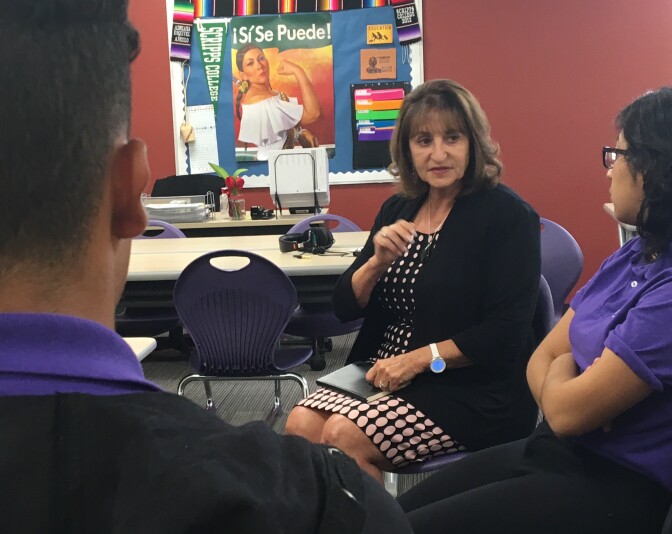This story is free to read because readers choose to support LAist. If you find value in independent local reporting, make a donation to power our newsroom today.
This archival content was originally written for and published on KPCC.org. Keep in mind that links and images may no longer work — and references may be outdated.
Like Yelp for school: How a charter network uses student reviews to change how they teach

Adrianna Lopez was the first one to raise an issue that had been brewing among her senior classmates at PUC Triumph Charter High School.
After Lopez finished all of the credits required for her diploma, the school scheduled her for another class. Wouldn't students' time be better spent, she posited, in a "free period" — a study hall, maybe, or guided research hour?
Nine of Lopez's classmates — all seated with her in a circle of chairs in an empty classroom — seemed to agree; this was a burning issue. The only adult in the room, Jacqueline Elliott, spoke up.
"This is the first time I've ever heard this," said Elliott, one of the co-founders of the PUC network of charter schools, "so this is really exciting. Maybe somebody could tell me: how do you envision the free period?"
The students offer their suggestions. Elliott pencils them into the black, bound notebook on her lap, ending the conversation with a promise: "I will take this back to administration."
The focus group-style exit interview Elliott's conducting has become part of the year-end ritual at PUC (which stands for "Partnerships to Uplift Communities"). Over five weeks, Elliott spoke with all of the roughly 260 seniors graduating from the charter network's high schools in the San Fernando Valley, including Triumph. The network's other co-founder, Ref Rodriguez, interviews the seniors at PUC's high schools in East Los Angeles.
Since 2010, the first year Elliott says they began the practice, their questions to the seniors have been simple: what about their school is working? What about it is not? The co-founders then share the answers with campus administrators — and those answers have even occasionally prompted changes to how PUC schools are run.
"Ms. Elliott, she's kind of like the Yelp service: she wants the truth on everything," says senior Roberto Cabigao, who just graduated from Community Charter Early College High, another PUC school.
Both co-founders are busy people — Rodriguez is on the L.A. Unified School Board; Elliott is the chief executive officer of PUC's central office, which offers services like I.T. and human resources to the network's 17 schools, 900 employees and more than 4,000 students.
But Elliott said the exit interviews are worth her time. They solve a central irony of her work: though PUC now boasts one of L.A.'s largest portfolios of charter schools, Elliott started her first charter in 1999 as an alternative to schools she saw as too big and too impersonal.
"In the beginning … I knew what was going on every minute, and the students— I knew all of them really well," Elliott told the seniors in the circle at Triumph. "But now, I don't know all of the students really well and I worry that my vision that I had in the beginning of the type of school culture that we would have, the type of connectedness, is maybe not happening."
The exit interviews, Elliott said, are a corrective to that problem, ensuring insights like Lopez's — that seniors who've completed all their credits would rather have a free period to study or apply to college — aren't lost.
"The culture of the organization is that the student voice is critical," said Elliott, who estimates she's conducted at least 60 of the group interviews since 2010. "Who better can tell you what they need than the students themselves, right?"
And students aren't always easy on themselves in their suggestions.
For instance, many PUC high schools used to allow students to re-take tests to try and get a better score — a common practice in schools using standards-based grading. But in their exit interviews last year, the seniors at one PUC high school told Elliott they thought teachers should end the practice.
Kayla Martin, who's among this year's graduates from PUC Community Charter Early College High, said some students felt comfortable blowing off tests because they could retake them. But that left them feeling less-prepared for college.
"Once you get to college, you can’t retest," she said. "Once you get that grade, that’s it. You try to go to a professor and say, 'Retest,' and they’re going to laugh at you and say, 'We don’t do that.'"
Elliott passed along that feedback — and administrators changed the policy. Now, students can only retake "formative assessments," or quizzes.
"By her listening to those students and implementing the change, I'm pretty sure that our college readiness is going to be a lot better compared to the previous class," said Cabigao.
Elliott says few of her takeaways from the exit interviews are completely new, like the "free period" idea. More often, the feedback students give either validates the school's doing something right or backs up staff suspicions that something isn't working.
In the exit interview at Triumph, students raised concerns about the cafeteria food, which the school's current vendor prepares off-site. Elliott said Triumph's food manager has been on the case, working with the vendor to offer more hot breakfast options despite limited kitchen facilities at the small school.
But the graduating seniors also expressed gratitude for the personal attention they received from Triumph staff — and from Elliott.
"I appreciate you Dr. Elliott," said senior Michael Torres. "You’re trying to put in the extra effort — I’m sure you’re a busy woman — to really connect with the kids."







